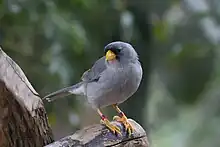Cinereous finch
The cinereous finch (Piezorina cinerea) is a species of South American bird in the tanager family Thraupidae. It is the only member of the genus Piezorina. It is found in arid coastal regions of northern Peru, with a single record, presumably a straying bird, from immediately adjacent Ecuador.
| Cinereous finch | |
|---|---|
 | |
| In Sedgwick County Zoo, Kansas | |
| Scientific classification | |
| Domain: | Eukaryota |
| Kingdom: | Animalia |
| Phylum: | Chordata |
| Clade: | Dinosauria |
| Class: | Aves |
| Order: | Passeriformes |
| Family: | Thraupidae |
| Genus: | Piezorina Lafresnaye, 1843 |
| Species: | P. cinerea |
| Binomial name | |
| Piezorina cinerea (Lafresnaye, 1843) | |
 | |
| Synonyms | |
| |
Taxonomy
The cinereous finch was formally described in 1843 by the French ornithologist Frédéric de Lafresnaye under the binomial name Guiraca cinerea. In the same publication he proposed a new genus Piezorina with the cinereous finch as the type species.[2] Lafresnaye believed that his specimen had come from the Galápagos Islands, but it does not occur there and in 1930 the American ornithologist Outram Bangs amended the type location to northwest Peru.[3][4] The genus name combines the Ancient Greek piezō meaning "to crush" with rhinos meaning "nose". The specific epithet cinerea is Latin and means "ash-grey" or "ash-coloured".[5] The species is monotypic: no subspecies are recognised.[6]
A molecular phylogenetic study of the tanagers published in 2014 found that the cinereous finch was a member of the subfamily Poospizinae and was closely related to the slender-billed finch (Xenospingus concolor).[7]
References
- BirdLife International (2018). "Piezorina cinerea". IUCN Red List of Threatened Species. 2018: e.T22723182A132161285. doi:10.2305/IUCN.UK.2018-2.RLTS.T22723182A132161285.en. Retrieved 12 November 2021.
- de Lafresnaye, Frédéric (1843). "G. Gross-Bec. Coccothraustes. Cuv". Magasin de zoologie, d'anatomie comparée et de palaéontologie. 2nd series (in French). 5 (Cl. 2): 2, Plate 30.
- Bangs, Outram (1930). "Types of birds now in the Museum of Comparative Zoölogy". Bulletin of the Museum of Comparative Zoology. 70 (4): 147–426 [370].
- Paynter, Raymond A. Jr, ed. (1970). Check-List of Birds of the World. Vol. 13. Cambridge, Massachusetts: Museum of Comparative Zoology. p. 115.
- Jobling, James A. (2010). The Helm Dictionary of Scientific Bird Names. London: Christopher Helm. pp. 107, 306. ISBN 978-1-4081-2501-4.
- Gill, Frank; Donsker, David; Rasmussen, Pamela, eds. (July 2020). "Tanagers and allies". IOC World Bird List Version 10.2. International Ornithologists' Union. Retrieved 10 November 2020.
- Burns, K.J.; Shultz, A.J.; Title, P.O.; Mason, N.A.; Barker, F.K.; Klicka, J.; Lanyon, S.M.; Lovette, I.J. (2014). "Phylogenetics and diversification of tanagers (Passeriformes: Thraupidae), the largest radiation of Neotropical songbirds". Molecular Phylogenetics and Evolution. 75: 41–77. doi:10.1016/j.ympev.2014.02.006. PMID 24583021.
